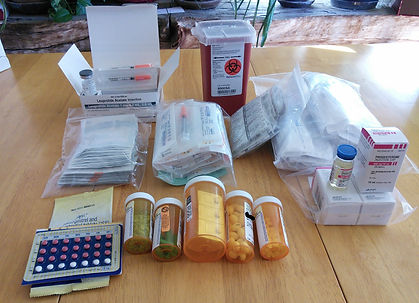Medications
Most surrogates will do a medicated cycle. Even those who do a natural or non-medication cycle, will still take some medication(s).
Since they are the most common, I will talk about medicated cycles first.
Protocols can vary fairly widely between clinics, but there are two medications that will always be taken: estrogen and progesterone. The reason being that these are the hormones that naturally regulate a woman's cycle. The clinic wants to have precise control over your cycle before transfer, so these hormones are taken in order to do so.

In a Natural Cycle
-
Estrogen gradually increases during the first half of your cycle
-
Estrogen causes your endometrial (uterine) lining to thicken
-
FSH causes one follicle to become dominant
-
When your estrogen gets high enough, it sets off your LH
-
LH triggers ovulation
-
When you ovulate, the dominant follicle releases an egg and produces a corpus luteum
-
The corpus luteum produces progesterone
-
Progesterone increases blood flow and keeps the uterus from contracting, creating a receptive environment for implantation
-
If fertilization and implantation happen, the corpus luteum will continue to produce progesterone for about two months until the placenta is developed enough, at which point it takes over

In a Medicated Cycle
-
Estrogen is taken to thicken the endometrial lining
-
Ovulation is suppressed by the estrogen; no egg or corpus luteum are produced
-
On a specific date, which is related to the date you will transfer and the age of the embryo you will transfer, progesterone is started
-
Progesterone prepares the uterus for implantation
-
Progesterone is vital in maintaining a pregnancy; supplements will be continued until the placenta has taken over (usually between 10-12 weeks gestation)
Although you will certainly take estrogen and progesterone, there are different routes of administration (ROAs) in which you might take each - and you might even take one or both in more than one form.
Estrogen's ROAs: oral (pill), vaginal (pill or gel), transdermal (patch), intramuscular (shot)
Progesterone's ROAs: oral (pill), vaginal (pill), intramuscular (shot)
Other commonly prescribed medications are:
Birth control pills (BCPs) - These are used to manipulate your cycle (lengthen or shorten it), as well as suppress ovulation. Almost every protocol includes BCPs.
Baby aspirin - Almost every protocol will include these little 81mg aspirins. They are used to increase blood flow, which helps with implantation. This is also important to protect against forming blood clots, which is a side effect of the estrogen.
Leuprolide acetate/Lupron - This medication is taken via subcutaneous shot. It is used to suppress ovulation.
Antibiotics/doxycyline - There may be other kinds of antibiotics given, but this is the one I've always seen (and taken). This is just taken as a precaution, to clear up/prevent infection or excessive, harmful bacteria.
Steroid/Medrol or Prednisone - Again, other brands may be prescribed, but these are the ones that I've seen (I took the latter). This is taken to subdue your immune system, so that you don't have an immunoreaction and reject the embryo.
Fun Fact! If you are having trouble growing a thick endometrial lining, your RE might prescribe you to take Viagra vaginally.
Vitamins & Supplements
A lot of surrogates want to know what they can do to increase their odds of getting pregnant. Check out the list of vitamins and supplements below, and then head over to the Tricks for Success page for non-medicine tricks to consider.
I will also talk about supplements that egg donors or women going through IVF for themselves might be interested in.
Firstly, a prenatal vitamin should always be taken, ideally starting at least 3 months before transfer. Starting a daily regimen of at least 400mcg of folic acid before becoming pregnant, and continuing it throughout your pregnancy, helps to prevent birth defects such as neural tube defects (e.g. spina bifida), heart defects, and cleft lip and palate.
Supplements and their uses:
Vitamin C - Improves immune system function; may also help the
health of a developing embryo
Vitamin D - Improves embryo quality; improves chances of achieving
regnancy
Vitamin E - Improves blood flow
Myo-inositol - Improves symptoms and fertility in women with PCOS when taken with folic acid; increases number of mature eggs retrieved, quality and number of embryos created, and pregnancy outcomes when taken with melatonin
Coenzyme Q10 (aka Co-Q10) - Improves egg quality; decreases the number of abnormal embryos (aneuploidy); increases AFC and improves ovarian responsiveness when taken with DHEA; improves quality of sperm when taken by the male partner with MFI
DHEA - Beneficial to women with diminished ovarian reserve (DOR); increases number and quality of eggs; may improve chances of pregnancy
This is one that was recommended to me but for which the research varies and is insufficient, in my opinion:
L-Arginine - Improves blood flow; there is insufficient evidence for many other possible effects of l-arginine; it may improve the number of eggs produced during stimulation; may help male factor infertility (MFI); may improve pregnancy rates; may improve poor growth of fetuses; and may prevent NEC in preemies; however, some studies have also shown negative effects; it may decrease embryo quality and pregnancy rates in a hyperstimulated cycle; there are also not enough studies to know if l-arginine is completely safe during pregnancy
*You should do your own research to determine if you think l-arginine is beneficial.
**Note: If you are looking to do an egg retrieval, either as a donor or for yourself, and would like more information regarding improving egg quality, I have seen a number of ladies recommend the book It Starts With an Egg, by Rebecca Fett. (Disclaimer: I have not yet checked this book out, myself.)
Folic acid is a synthetic form of folate, also known as vitamin B9.
Did you know?
